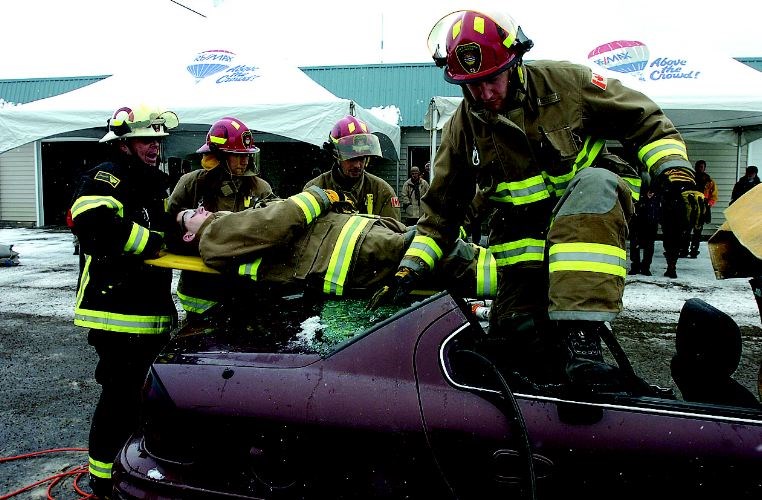Business has been a little slow lately around the Fort George Highway Rescue Society and Keith Laboucan likes it that way.
If they aren't getting calls to rescue an injured motorcyclist whose bike hit a patch of gravel and skidded into the ditch or bring their jaws of life to help save the life of a highway accident victim trapped in a vehicle, that usually means people are staying safe on the roadways outside the city limits.
But Laboucan, the FGHRS chief, knows there were 90 emergency calls that went out to the service last year to rally his team of skilled volunteers to the rescue hall at 4055 15th Ave. His crews serve an area of 24,000 square kilometres and things can get hectic in a hurry, especially in the cold-weather months,
"Last year we had five calls in October, 18 in November and 16 in December, so it was pretty busy for us," said Laboucan. "We've seen a lot of cases where people fall asleep at the wheel and you don't see any skid marks or anything, the guy just drives off the road."
Sixty per cent of the emergency calls the Fort George Rescue hall receives involve Prince George residents. The crews rely on two vehicles to respond to highway rescues as far north as Mackenzie, east to Slim Creek, south to Hixon and west to Mud River, as well as all side roads and logging roads. They also provide backup support for the further reaches of the Fraser-Fort George district.
"What Prince George doesn't understand is [volunteer] fire departments like Ness Lake, Pilot Mountain, Salmon Valley, Bear Lake, Shell-Glen, Hixon and Willow River are all unprotected for motor vehicle incident rescue," said Laboucan.
"They don't have the ability, expertise or manpower to do extrication there, so we've been doing it for them for 30 years, since we opened. We also do the gray areas, where there is no fire protection at all, so all you have is highway rescue coming to your aid. A lot of people don't know that."
To help raise awareness and generate funding for the society, Fort George Highway Rescue held its annual open house at its 15th Avenue headquarters. Crews were on hand to talk about what they do to save lives and staged a mock rescue to demonstrate how they use mechanical tools to free people in vehicles crushed in an accident.
Laboucan says highway accidents happen at high speeds and the wreckage usually reflects that. He remembers one accident near Pilot Mountain where the vehicle flipped on its roof and caved in and there was no way the fire department or RCMP could get at the injured person until highway rescue arrived.
"When we left there, Chief [Jim] Swan said how incredible he thought it was that we were able to raise the vehicle upside-down and create enough of an opening to get the guy out," said Laboucan. "They don't do stuff like that and they don't want that challenge."
The highway rescue crews train every Sunday from 6:30-8:30 p.m. at the hall. The crews are alerted to emergency incidents by the Prince George Fire Rescue Service's Fire Operations Communications Centre dispatch system, which relays calls from the Victoria-based provincial emergency program.
The 30-year-old society is facing a different kind of crisis now that it has been given notice by the owner of the hall property it will have to find a new home after 10 years at the current location because the land is about to be sold. The society receives provincial emergency funds for each call and also gets private donations, gaming grants and funding from the Fraser-Fort George regional district to cover its operating budget, but Laboucan says there's nothing in the kitty to cover construction of a new hall.
Although an alternate site on the corner of 18th Avenue and Foothills Boulevard has been identified, Laboucan fears Prince George could follow the example of Golden's highway rescue society, which folded this past spring. When that society folded, it left one of the most treacherous stretches of the Trans Canada Highway without a rescue service.
"We don't want to be in position like Golden, where the members get frustrated and burnt out and get tired of the extra stress when we're out of a home," said Laboucan. "If we don't have a home and we're not stabilized we could lose the service."



.png;w=120;h=80;mode=crop)